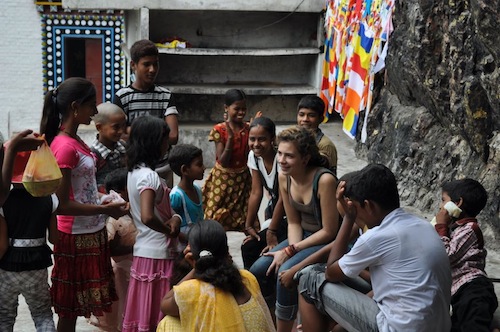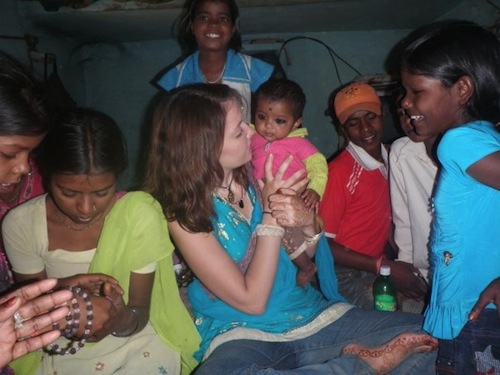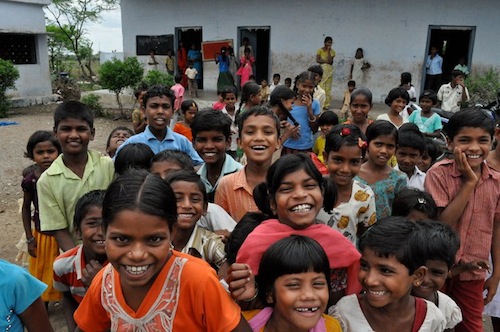Talking to strangers also keeps us safe
“Don’t talk to strangers!”
Possibly the worst advice I have ever gotten.
It’s a phrase most kids hear repeatedly from the moment they start to take their first steps into the world. Adults repeat these four words to kids like a mantra, hoping to keep the potential danger of a predator at bay. It is also one of many phrases we repeat to our kids that makes absolutely no sense in adulthood, especially once you start traveling. In fact, the more I travel, the more I realize just how bogus this tidbit of advice really is.
Every time I hear these words repeated, I cringe. Not only is “never talking to strangers” ridiculous, these four words are based in a deeply held fear that every person is a potential predator. Worse, it’s a phrase that communicates the notion that the only way for a person to stay “safe” is for them to stay disconnected from their fellow human beings. “Don’t talk to strangers” is just one of the ways we communicate the cultural belief that there is an “us” and there is a “them” and they are different… and a little bit scary.
How many times a day do you, as an adult, talk to strangers? How many times in your travels have you had to rely on the wisdom, kindness, or guidance of strangers? How many amazing experiences have you had that you can attribute to a chance connection with a stranger? How many times in your life have you gotten into trouble and needed to go to a stranger for help? Why would we deny these same things to our children?
Now think about how many times you have met a stranger on your travels and automatically recoiled, the often repeated warning bubbling up in your mind. Was that your gut talking or your conditioning? Has the advice “don’t talk to strangers” really served you? If it hasn’t, why keep passing along bad information to our youngest generation?
We are robbing our children and our future travelers of something very important every time we tell them “don’t talk to strangers”- their ability to trust themselves and connect authentically with their fellow human beings. Talking to strangers is one of the best things we can teach our children to do- and it is imperative if we expect them to ever venture out into the world on journeys of their own. Strangers know things we don’t know. Always. They can help, explain, give directions, and offer support. Strangers are a reflection of ourselves in innumerable ways and they offer glimpses at those invisible threads that bind all of humanity. They offer glimpses into worlds we never knew about and embody wisdom that can only be shared through trusting connection. Talking to strangers keeps us grounded and connected.
Talking to strangers also keeps us safe.
You heard me right, it keeps us safe. You know who I would run to in an emergency while traveling alone in India? A stranger. You know who I watch and listen to to figure out cultural norms in a new location? Strangers. You know who continually boosts my faith in humanity and reminds me that I am not alone, no matter where I am on this journey? Strangers. A whole bunch of wonderful strangers. One of the most important things travel has taught me is that every “stranger” is just a friend you don’t know yet.
Why, why, why then would we ever tell anyone not to talk to strangers?
Young people trust us. They look to adults for guidance, for better or worse. So, do we want to send them out to explore the far corners of our earth on their 18th birthday, holding onto a deep seeded belief that strangers are scary? Or do we want to encourage them to trust their guts, talk to strangers, have some faith in humanity, and make connections any time, any where they feel comfortable doing so?
I know which one I pick.
Besides, one of the biggest lessons travel has taught me is that every “stranger” is just a friend you don’t know yet.




May 1st, 2014 at 11:37 am
If you add up all the bad incidents or crimes that happen to people and analyze the perpetrators, you’ll probably find that many of them are done by people you know rather than strangers. That is true with certain kinds of assault. It is unfortunate that we are conditioned to distrust people we don’t know. The best place to start, is to be a Good Samaritan, or good citizen when people approach us for help.
May 7th, 2014 at 11:18 pm
Great work Jenni — the whole premise of my new book, FORKS—A Quest for Culture, Cuisine, and Connection (Three Years. Five Continents. One Motorcycle) is “There are no strangers, only friends you haven’t met.” One of the most important lessons I’ve learned in my travel and vagabonding through some 62 countries is, though I set off on these journeys alone, I’m never alone. It’s always possible to connect with people—humanity—everywhere. Even the most “dangerous” places. 😉
You’ve captured these truths and lessons perfectly in this in this well written and insightful piece. Thank you.
See you at the next fork!
May 8th, 2014 at 12:04 pm
That sounds like an excellent book, Allan! I am in utter agreement that we are never really ever alone. To be honest, I think most people who travel extensively come to the same realizations about connectedness and and “strangers”. I love Roger’s suggestion to just “be a good citizen” as a starting point. Such simple and obvious place to start that can lead to some pretty great connections with new people.
May 15th, 2014 at 12:00 am
[…] Fear of strangers, fear of immigrants, fear of change, fear of accidents, fear of pain, fear of sickness, fear of being taken advantage of, fear of being judged. We seem to love our fear, wrapping it around our language, our interactions, and our opinions like a much-loved blanket. We base our biggest and our smallest life choices around the concepts of “fear” and “safety”- it’s not even just a concept or a feeling anymore, it’s a way of life. Where to buy a house, which school to send our children to, what car to buy, what advice to take, which job to accept, how to treat our illnesses, who we interact with, even what clothes to buy are all decisions we make on a daily basis, out of fear. By far, the #1 reason I hear from people as the reason they do not travel, especially long term, is fear- fear of the unknown, fear of danger, fear of things that are different. […]
March 19th, 2015 at 8:06 am
[…] journey. Jenni is a writer and has written for several online publications including bootsnall.com, Vagablogging.net and her own website Witness […]